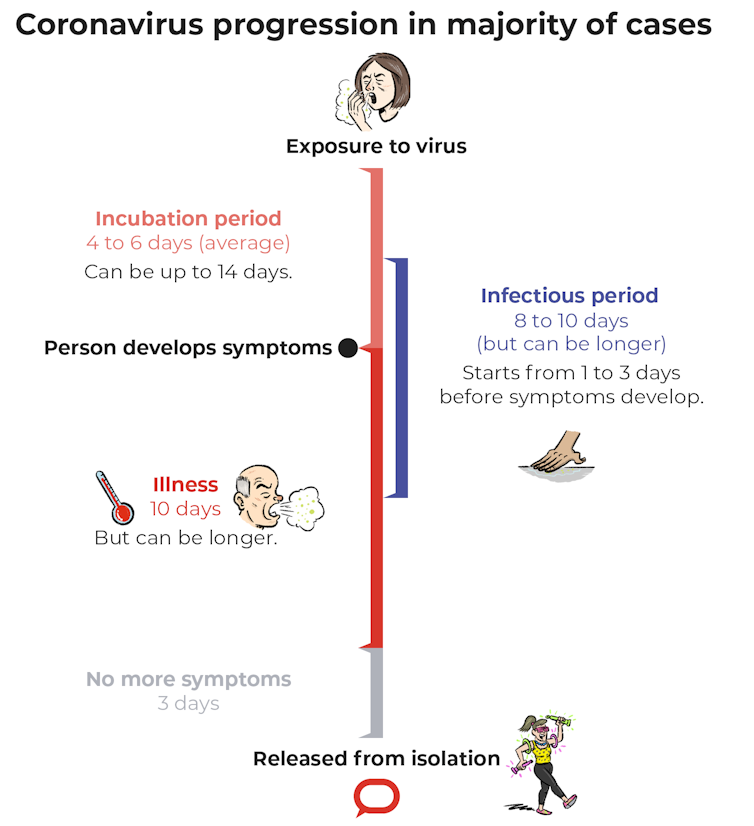How Long Can You Live With 20 Heart Function
Every bit the coronavirus pandemic stretches on, a small proportion of Australians infected accept now died, while most accept either recovered, or are likely to recover over the next few weeks.
One matter many of united states want to know is for how long people who have SARS-CoV-2, the virus that causes COVID-19, are able to pass it on to someone else.
Let'southward look at what the science tells us so far.
How long does it take to go ill?
The "incubation menstruation" is the time between existence exposed to the virus and the onset of symptoms.
For COVID-19, the incubation menstruum ranges from 1 to xiv days. But well-nigh people who develop COVID-nineteen symptoms do and so 4 to half-dozen days afterwards exposure.
Baca juga: Coronavirus: how long does it take to get sick? How infectious is information technology? Will you always have a fever? COVID-19 nuts explained
How long are you lot infectious?
The "infectious catamenia" ways the time you lot're able to spread the virus to someone else.
For COVID-19, at that place is emerging testify to suggest the infectious period may outset ane to 3 days before you develop symptoms.
The most infectious period is idea to be i to 3 days before symptoms starting time, and in the offset 7 days later symptoms begin. Merely some people may remain infectious for longer.
Ordinarily reported symptoms for COVID-nineteen – such equally fever, cough and fatigue – usually concluding around 9 to 10 days only this can be longer.

Why are some people infectious for longer?
Typically with viruses, the college the viral load (the more virus circulating in the torso), the higher the take chances of transmission through known transmission pathways.
A written report conducted in Hong Kong looking at viral load in 23 patients diagnosed with COVID-nineteen found higher viral loads in the commencement week of illness.
Another report from People's republic of china looking at 76 hospitalised patients found that by 10 days after symptom onset, mild cases had cleared the virus. That is, no virus was detectable through testing.
Even so, severe cases have much higher viral loads and many continue to test positive beyond the x days after symptoms get-go.
Then the more severe the disease and the higher the viral load, the longer you continue to shed the virus and are infectious.
Baca juga: How can I treat myself if I've got – or remember I've got – coronavirus?
When are you no longer infectious?
If someone has been symptom-free for three days and they developed their showtime symptoms more x days prior, they are no longer considered to exist infectious.
But we're not sure whether people are infectious when they have recovered just the virus tin nevertheless be detected in their bodies.
One study from Hong Kong found the virus could be detected for xx days or longer afterward the initial onset of symptoms in one-third of patients tested.
Some other study from China establish plant the virus in a patients' faecal samples five weeks later on the first onset of symptoms.
But the detection of the virus doesn't necessarily mean the person is infectious. We need more studies with larger sample sizes to get to the lesser of this question.
Should you get tested again before going dorsum into the community?
Due to a global shortage of coronavirus tests, the Commonwealth and state governments have strict criteria about who should exist tested for COVID-19 and when.
Baca juga: Who can get tested for coronavirus?
People who take been cocky-quarantining, considering they had contact with a confirmed example of COVID-19 and have completed their 14-day quarantine menses without developing symptoms, tin can return to the community. There is no requirement to be tested prior to returning to the community. It is, however, recommended they proceed to exercise social distancing and good hygiene as a precaution.
The requirements are different for people who have been diagnosed with COVID-19.
Now, re-testing people who have experienced balmy affliction, and have recovered from COVID-xix is not recommended. A person is considered safe to return to the community and discontinue self-isolation if they are no longer infectious. This means they developed their first symptoms more than 10 days prior and accept non experienced whatever symptoms for at least three days (72 hours).
For people who have been hospitalised with more than severe illness, the testing requirements earlier discharge are different. They will have two swabs taken 24 hours autonomously to check if they have cleared the virus. If the swabs are both negative, they can be discharged and don't require further self-isolation.
If one or both tests are positive but the person is well plenty to get domicile, they must continue to self-isolate for at to the lowest degree 10 days since they were discharged from hospital and they have not experienced whatsoever symptoms for at least iii days.
At that place are besides different testing requirements for people working or living in loftier-risk settings. If you piece of work or live in a high-risk setting you should consult with your health intendance provider on re-testing requirements.
Source: https://theconversation.com/how-long-are-you-infectious-when-you-have-coronavirus-135295
0 Response to "How Long Can You Live With 20 Heart Function"
Post a Comment